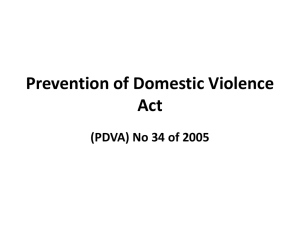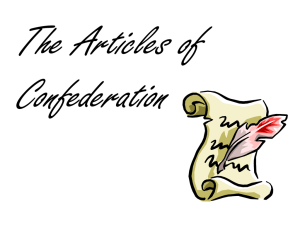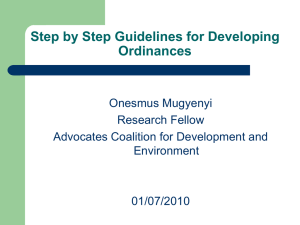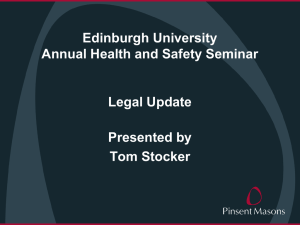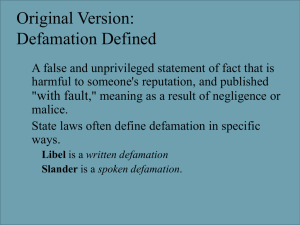下載檔案 - Hkilt.com
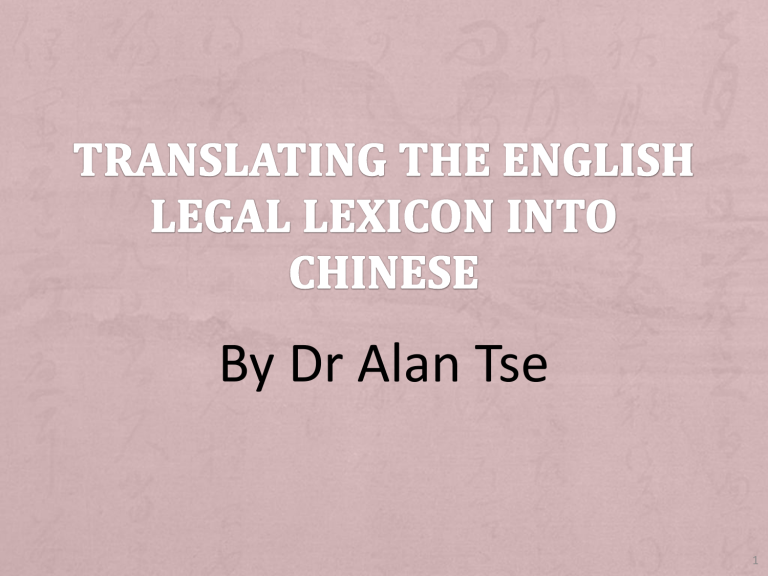
By Dr Alan Tse
1
+
+
+
+
+
[a] consistency and uniformity
[b] role of context
[c] adopting Chinese legal terms used in
Mainland China
[d] the use of existing translations
[e] style and register
2
+ Precision— the relative stability of the conceptual link between a word and the concept it stands for .
+ independent of the context
+ high degree of consistency in the translation
3
A thing recoverable by action, as contrasted with a chose in possession which is a thing of which a person may have not only ownership but actual physical possession.
有權通過訴訟獲得的動產
4
1.
2.
3.
據法權產 s 9 Assignment of debt or chose in action, Law Amendment & Reform
(Consolidation) Ordinance, Cap 23
法據動產 s 3 Interpretation of words and expressions, Interpretation & General Clauses
Ordinance, Cap 1 (under 財產 )
無形動產 s 63(2) and (4) of the Securities &
Futures Commission Ordinance, Cap 24 (1997 version, repealed in 2002)
5
+ In good faith: 善意、真誠 、 秉誠 (in some bills)
+ Not in good faith: in the Commissioner for
Administrative Complaints Bill 1987 申訴專員
條例草案 (later changed to The Ombudsman
Ordinance, Cap 397; 申 訴 專 員 條 例 ) was translated into 用心不良
6
(b) the subject matter of the complaint is trivial;
(c) the complaint is frivolous or vexatious or is not made in good faith ; or
(d) any investigation or further investigation is for any other reason unnecessary.
(b) 申訴關乎微不足道
的事;
(c) 申訴事屬瑣屑無聊、
無理取鬧或 非真誠 作
出 ;或
(d) 因其他理由而無須
調查或進一步調查。
(s 10 THE OMBUDSMAN
ORDINANCE, Cap 397; 申訴專員
條例)
7
+ (a) his performance or purported performance in good faith of any function (including that under each of the paragraphs of section 5(1)) under any of the relevant provisions; or
+ (a) 真誠地執行或其本
意是真誠地執行 任何
有關條文授予的職能
(包括第5(1)條各段授
予的職能);或
(s 380, SECURITIES AND
FUTURES ORDINANCE, Cap 571;
證券及期貨條例)
8
Law (esp. statute laws and contracts)
+ notoriously fastidious about the meanings of words
+
+
+
must be able to express what the drafter/legislator wishes to express
disputes on the interpretation of certain expressions in a law (statutory interpretation)
few disputes on the interpretation of the words and expressions in a judgment, not to mention textbooks on law
9
In a bilingual setting
one language version is intended to exist with the other and work in exactly the same way
lawyers will contest a point or justify their interpretation of a particular law by comparing the two language versions
10
+ [context refers to] the total setting in which a word is used, including the cultural context and the linguistic context , which in turn consists of the syntactic context and the semiotic context. One function of the context is to select for each word the single appropriate meaning, and so to avoid ambiguity in a discourse.'
(Nida and Taber 1982: 199)
11
A term has different meanings in different contexts?
YES have a reasonable degree of freedom and flexibility
Otherwise observe the consistency rule as far as possible
12
+ Plaintiff: a person who brings a legal action against somebody 原告、起訴人
+ Arbitration: settling of a dispute by a person or people chosen to do this by both sides in the dispute 仲裁
13
Custody
+ (1) confinement or imprisonment 羈押
(Fugitive Offenders Ordinance)
+ (2) control and possession of some thing or person 保管
(Road Traffic Ordinance)
+ (3) the right to look after a child after a divorce 管養權 or 看管權
(Protection of Children & Juvenile Ord.)
14
Premises
+ house or building with its outbuildings, land, etc
residential premises rendered as 住宅樓宇
+ In the Drug Trafficking (Recovery of Proceeds)
Ordinance 販毒追討利益條例 s 22, Cap 405:
“premises” includes vehicles, vessels, aircrafts etc.
However, “premises” was still rendered as 房
產 in the ordinance.
15
In order to reflect the broad scope of the definition of “premises” in English, it was translated into “ 處所 ” elsewhere: e.g. The Aviation Security Ordinance ( 航空保安
條例 )
LexisNexis bilingual law dictionary
16
Will it create confusion if legal terms used in China and
Taiwan are adopted in the translation of statutes in the present context, since we are dealing with three different systems?
17
+ Rabies
+ translated into 狂犬病rather than 瘋狗症
狂犬病generally used in both China and
Taiwan
Why not adopt 瘋狗症 (which is more common in HK) ?
system neutral (more of a medical concept than a legal concept?)
狂犬病 carries a more formal tone than 瘋
狗症
18
+ The case of Murder and manslaughter
In Hong Kong
+ translated into 謀殺 and 誤殺 respectively
In China
+ 謀殺 and 誤殺 do not feature in the criminal codes
+ Instead, there is the crime of 故意殺人 , which literally means `killing a person intentionally' and the crime of 過失殺人 , which means `killing a person negligently‘
19
+
+
+
+
+
故意殺人罪 (中國刑法第232條),是指故意非法
剝奪他人生命的行為
是一種最嚴重的侵犯公民人身權力的犯罪…
本罪是故意犯罪,包括 直接故意 和 間接故意 。
直接故意 是有 明確的殺人目的 ,並且希望其行為
能致使被害人死亡;
間接故意 是對自己的行為可能造成被害人死亡的
後果 採取放任的態度 。
20
本港貨櫃車今年 4 月在深圳撞傷女子及
捲走嬰兒車釀成子死母重傷一案,涉案
香港司機昨在深圳被起訴故意殺人罪 …
代表周家的律師史聞紅表示,被告在法
院上承認車禍罪名,但否認直接殺人罪,
相信因為直接及間接殺人兩罪的判刑差
太多,前者可判死刑,後者最高判無期
徒刑。辯護律師應會為被告求情,希望
法院能以間接殺人罪名來判刑。
21
(官方名稱為過失致人死亡罪,中國刑法第233條)
+ 是指過失致人死亡的行為,包括 疏忽大意的過失
致人死亡和 過於自信的過失 致人死亡
+ 疏忽大意 的過失致人死亡是指行為人應當預見自
己的行為可能造成他人的死亡結果,由於疏忽大
意而沒有預見,以致造成他人死亡
+ 過於自信的過失 致人死亡是指行為人已經預見到
其行為可能會造成他人死亡的結果,但由於輕信
能夠避免以致造成他人死亡。
22
【明報專訊】去年底深圳羅湖汽車站發生旅巴
剷行人路車禍, 3 名港人及 2 名內地人死亡,另
5 人受傷的,涉案被捕的內地旅遊巴司機,近
日在羅湖區人民法院一審被判「過失致人死亡」
罪名成立,判處有期徒刑 5 年。但初步被告不
服判決,並已提出上訴。
23
+
+
(1) A person who causes the death of another person by driving a motor vehicle on a road dangerously commits an offence and is liable-
(a) on conviction on indictment to a fine at level
5 and to imprisonment for
10 years; (Amended 23 of
2008 s. 5)
(b) on summary conviction to a fine at level 4 and to imprisonment for 2 years.
+ (1) 任何人在道路上危險駕
駛汽車引致他人死亡,即
屬犯罪 ─
+
(a) 一經循公訴程序定罪,
可處第 5 級罰款及監禁 10 年;
( 由 2008 年第 23 號第 5 條修
訂 )
(b) 一經循簡易程序定罪,
可處第 4 級罰款及監禁 2 年。
24
全国政 协委员、四川鼎立律师事务所主任施杰
在 2010 年政 协会议上提交提案, 建 议增设 “ 危
险驾驶罪 ” 。他 说,目前无证、醉酒和超速驾车
行 为最严重的处罚也就只行政拘留十五天,不
足以震 慑酒后驾车等危险驾车 行 发生 。
Source: http://baike.baidu.com/view/3355825.htm
25
本 报北京
4 月 28 日 电
(
记者王亦君何春中
) 《刑法
修正案 ( 八 ) 》即将从 5 月 1 日起 实施,最高法院、
最高 检察院今天发布 《关于 执行 〈中 华人民共
和国刑法〉确定罪名的 补充规定
( 五 ) 》, 补充、
修改了 10
项罪名。其中,备受关注的 醉酒 驾驶、
飙车等行为入刑 后,正式有了一 项新罪名:
“
危 险驾驶罪
” 。
Source: http://www.sina.com.cn
2011 年 04 月 29
日 06:23 中国青年 报
26
+ At the technical level,
malice aforethought (預懷惡意、預謀) is a requisite for the conviction of murder in the common law
故意殺人 does not match perfectly with the notion of with malice aforethought (預懷惡意、預謀)
Murder is also related to such concepts as mens rea (造意、
犯罪意圖), deliberation and premeditation (預謀)
過失殺人 should not be regarded as equivalent to
` manslaughter ’, which is related to such concepts as
`diminished responsibility’(減輕罪責) and `provocation’
27
Voluntary manslaughter occurs when the defendant kills with malice aforethought (an intention to kill or cause grievous bodily harm ), but one of those partial defences which reduce murder to manslaughter applies…The Homicide
Act 1957 now provides two defences which may be raised to allow the court to find the accused guilty of voluntary manslaughter: diminished responsibility and suicide pact. The Coroners and
Justice Act 2009 creates the defence of "loss of control".
28
Involuntary manslaughter arises where the accused did not intend to cause death or serious injury but caused the death of another through recklessness or criminal negligence . For these purposes, recklessness is defined as a blatant disregard for the dangers of a particular situation.
29
•
•
The common-law concepts of murder and manslaughter have developed in a legal system which is entirely different from the one in China
The cases heard and precedents quoted have all borne on the development of the concepts
30
• During the process of their development, the concepts of murder and manslaughter have entered into a structural relationship with other related concepts, and as such they have formed an internal/closed system.
The identity of any related concept is situated within this internal system.
31
• Homicide 殺人 , culpable homicide 應受處罰的
( 有罪的 ) 殺人 , justifiable homicide 合法殺人 , mens rea, actus reus 犯罪行為 , self-defence, provocation, state of mind, insane and noninsane automatism 神志不正常及神智正常的
自動作用
32
+ However, the laymen often equate 故意殺人 with murder and 過失殺人 with manslaughter because in their conceptual world, these concepts are quite similar.
33
+ Communication will be effectively enhanced since people are more familiar with existing translations than with new ones.
+ The translated term and the source-language term already share a common reference scheme .
+ E.g. `Murder' and `謀殺' are now conceptually equivalent .
34
+ The creation of some esoteric new terms to replace translations already in existence and use would only lead to a breakdown in communication
(e.g. Satisfied 信納:
「信納」一詞,早已有
之,見《晉書.裴秀傳》,只是信任、任用、委
以重任之意,如「軍國之政,多見信納」或「尊
尊親親,信納大臣」,顯非港府今用之義。
)
+ Compromising the legal effect of the
Chinese terms.
35
1.Legal & Para-legal activities
Most Chinese legal terms have originated from legal and para-legal activities.
Legal activities: linguistic interaction between
Chinese and English at the court of law and during the legislating process of statutes)
In para-legal activities, the various law enforcement agencies (the police, the
Immigration Department and so on) and law firms.
36
2. leaflets and pamphlets
+ Laws which were thought to be of public interest were translated into Chinese and published in the forms of leaflets and pamphlets .
+ These Chinese texts contained a repertoire of translated terms which we use today as `existing translations'.
+ Before the Interpretation and General Clauses
(Amendment) Ordinance釋義及通則(修訂)條例 and the Official Languages (Amendment) Ordinance法定
語文(修訂)條例 formalized the bilingualization of
Hong Kong statutes in 1987
37
3. Chinese-language newspapers, magazines
+
+
+
+
Most local Chinese-language newspapers feature daily coverage of court news. High-profile cases are also reported in popular magazines.
In reporting court news, they have inevitably come up with a pool of Chinese translated terms.
In reporting criminal cases, the press has frequent contact with the police and other law-enforcement bodies in the government.
Therefore, the Chinese legal terms in local newspapers are quite similar to those commonly used by the police and other law-enforcement agencies.
38
+ Disadvantage: Most newspapers concentrate on the reporting of criminal cases, and only civil cases involving high-profile personalities are reported.
+ The concentration of reporting on criminal cases means that the scope of the translated terms is largely restricted to criminal cases.
+ Terms for the civil facet of the law come few and far between.
39
+
+
+
4.Books written in the Chinese language for lay readers
Relatively marginally, there are also the
`unofficial' translations in books written in the
Chinese language for lay readers who are interested in certain aspects of the law.
There have been few such books published in
Hong Kong.
But the situation is changing in response to the promotion of legal bilingualism in the territory.
40
+ The production of a complete legal lexicon entails systemicity .
+ As far as the four sources are concerned, it seems that the translation of English legal terms has generally been done in a piecemeal manner (零
零碎碎地) , which defies systemicity.
+ It is understood that very few newspapers, for instance, distinguish linguistically, and probably conceptually, between defamation, libel and slander .
誹謗 is used for all of the three concepts.
41
+
+
+ defamation (the tort consisting in the publication of a false and derogatory statement respecting another person without lawful justification) libel (defamation by means of writing, print, or some other permanent form) slander (defamation by means of spoken words or gesture).
The translation of these three terms should attempt to reflect their (subtle) differences.
+ In Commercial Press' Concise English-Chinese Law
Dictionary, `Defamation' is translated into 誹謗 , `libel' into 書面誹謗 and `slander' into 口頭誹謗 .
42
likely 相當可能 very likely 很可能 most likely 極可能
Possible 可能
Probable 頗有可能
+ Semantic field
+ To reflect the degree of probability.
43
+
+
+
+
+
+
+
+
+
Laws of Hong Kong:
Chapter 章
(Short title) 簡稱
Section 條
Subsection 款
Article (公約) 條文;第…條
Clause (合約) 條款;第…條
Sub-clause 副條款
Rider 附加條款
44
+ Legal language is widely recognized as belonging to a formal register .
+ “certificate of absence of marriage record ”
+ 寡佬證
+ 無結婚紀錄證明書
45
eviction
+ translated into 驅離 rather than趕走. illegitimate (child not born in a valid marriage)
+
+ rendered into 非婚生子 rather than 私生子
(child born privately or in secret),
私生子is colloquial and carries a social stigma.
46
Burglary
+ The official translation was 入屋行劫罪 (entering a place to rob)
+ Later changed to入屋犯法罪 (Theft Ordinance, Cap
210)
+ The expression 爆竊 (break in a place to steal. cf: burgle 爆格) which denotes the same crime has been known to almost every Chinese speaker in Hong Kong.
+ Possible explanation?
47
Does a translator have the right to, adjust an established translation of a term in order to suit the style of a particular text, for example, in terms of collocation ( 搭配 )?
This depends on the text-type of a particular legal text. i.e. In the case of statutes (written laws 成文法) and contracts, the need for adherence to standardized translations and faithfulness to the original text is much greater than in the case of law textbooks and arguably judgments (判詞) .
+ Within a piece of legislation, there are terms which contain heavier `information load' than the others.
+ E.g. In the Rabies Ordinance , the disease is beyond dispute the central theme.
The translator/draftsman should always keep to the same translation for the term
`rabies'.
+ In ` possess information ', ` possess drugs ' and ` possess animals ',
+ the verb `possess' can be translated into
掌握 (as in the Securities (Insider Dealing)
Ordinance), 藏有 (as in the Dangerous
Drugs Ordinance) and 管有 (as in the
Rabies Ordinance) respectively.
THE END
Merci Beaucoup


